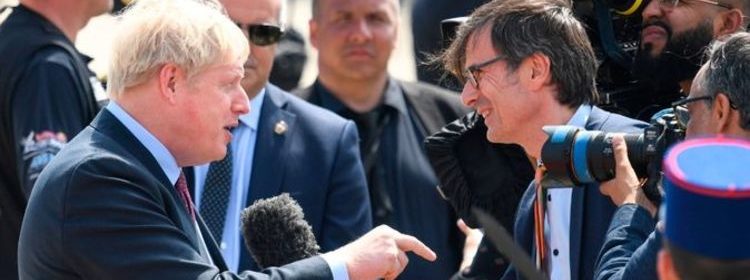‘What a mess!’ Peston lists five factors that could pop UK’s ‘very fragile’ economy

Robert Peston discusses the future of Boris Johnson
We use your sign-up to provide content in ways you’ve consented to and to improve our understanding of you. This may include adverts from us and 3rd parties based on our understanding. You can unsubscribe at any time. More info
Writing on Twitter, Mr Peston suggested “the gods of economy are laughing” at the UK. He wrote: “All through Covid, the terror was that the dreadful virus would lead to high unemployment and reinforced deflation. “But because of unprecedented interventions to save jobs, we’ve emerged – as today’s labour market stats confirm – with record numbers of vacancies, relatively low unemployment and strongly rising wages (even adjusting for the Covid related special factors).
“These are inflationary conditions. The pressure on the Bank of England to increase interest rates, even as soon as November, will intensify.
“But the recovery is simultaneously strong and VERY fragile.
“With tax rises, benefit cuts and increases in the price of basics – gas, petrol, food – squeezing living standards, especially for those on middle to low incomes. What a mess.”
This comes as grocery bills, energy costs and other household expenses continue to rise, putting the pinch on people’s day-to-day spending.


The most recent figures show prices rose by an average of 3.2 percent over the past 12 months. The Bank of England now thinks the figure could rise above four percent by December – and stay that high until the spring.
A worldwide surge in demand for oil and gas has triggered a price increase, which not only leads to a rise in electricity bills for the average household, but also has a significant knock-on effect on businesses that have to heat offices and run machinery.
These costs are being passed on to customers in the form of higher prices.
The issue of rising prices and tougher living standards is compounded by the removal of pandemic support, which has been providing much needed relief to businesses throughout the last 18 months.


The furlough scheme, which came to an end on September 30, 2021, supported 11.6m jobs and cost the Government £66bn throughout the pandemic.
As Government financial support is pulled back, businesses are having to cover an increased number of costs, which – once again – is being passed on to consumers.
Meanwhile, the number of job vacancies remains at a record high.
From July to September 2021, vacancies were more than 1.1m – an increase of nearly 318k from pre-pandemic levels. This marks the second consecutive month the average number of vacancies has risen over one million.
DON’T MISS
Peston pinpoints crucial challenge Starmer to face in race to power [OPINION]
Brits on UC four times more likely to face energy bill hike [REVEALED]
Universal Credit cut: How much money will I lose in Government cut? [INSIGHT]

This is not the first time Peston has criticised the UK Government for their economic policy in recent weeks.
In an article for ITV in September, Peston predicted a “two-phase onslaught on the living standards of those on low-to-middling incomes.”
He wrote: “On October 1 the energy price cap, for dual fuel, rises from £1,150 to £1,277 – a rise of 11 percent – when furlough is ending and a few days before the £1,000 a year uplift to Universal Credit is removed (which presumably Boris Johnson will not be swanking about in his big speech to Tory conference that day).
“That’s the first hit to living standards.

“There’ll then be a gradual further erosion of living standards with rising food inflation (of around five percent, as per what Tesco’s chairman John Allan said on my show last night).
“The second big onslaught however comes in April, when the energy price cap is expected to be raised a further 17 percent (!!!) to just under £1,500, based on the current wholesale price for gas.
“And that is precisely when Boris Johnson’s 1.25 percentage point rise in national insurance kicks in, taking £12 billion a year from households and business.”
The Bank of England is expected to tackle price rises by increasing interest rates in December, which would make them the first major central bank to raise rates since the onset of the pandemic, despite voting unanimously in September to keep interest rates at 0.1 percent.
Bank of England policymaker Michael Saunders told households to prepare for “significantly earlier” interest rate rises, the Telegraph said on Saturday.
But Saunders said: “I’m not in favour of using code words or stating our intentions in advance of the meeting too precisely. The decisions get taken at the proper time.”
Source: Read Full Article
